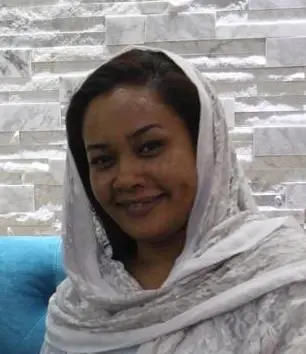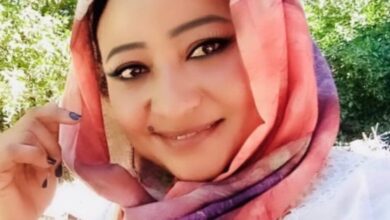Women’s Voice: The Feminine Power

Amal Mohammed Al-Hassan writes… Women’s Voice: The Feminine Power
War is ignited by men, and its price is paid by women! The war didn’t stop in this country for decades in the south of the country, then in Darfur, the Nuba Mountains, and the Blue Nile, before the final hellish war broke out in Khartoum and expanded to the rest of the country, and even the states it has yet to reach are living in poverty, with private and governmental institutions closing, as well as businesses and most factories that were based in the country’s capital, going out of business.
The greatest burden in these wars falls on women, mothers, sisters, pregnant and breastfeeding women. They are the ones who have to organize family affairs with scarce resources, ensure that every hungry mouth is fed, and watch over the sick without medical assistance.
Pregnant women who have to deal with these conditions suffer, and experience encounters with death, as they work to preserve the life that resides inside their wombs! Women are the ones who feel the greatest bitterness of loss when their husbands or children die. I cannot imagine what a mother feels like when she is carrying in her hands a child who has been hit by a stray bullet or shrapnel, and she doesn’t know where to turn amidst the rubble, aerial bombardment and the roar of warplanes!
Many a housewife was forced to work in any profession, for the first time in their lives after they separated from or lost the breadwinner, in order to play dual roles in working, providing food, raising children, and caring for them, in circumstances everyone suffers from, and no one has a spare meal for anyone else!
Women lost their privacy in exercising the most basic human rights, from using the bathroom to dealing with their menstrual cycle, by being among huge numbers of strangers in shelter centers, schools, or other places. I remember meeting a bride in a shelter center in the city of “Dongola.” She and her husband were separated from the rest of the refugees by a sheet that was blown back and forth by the wind. She repeats, “I wasn’t like this.” She misses putting on makeup and taking care of herself. It kills her because she appears so pale when she is on the most beautiful days of her life!
As for what women are exposed to in regards to forms and types of sexual violence, this is an even more brutal, cruel and heinous story! The main reason behind the continuation of such violations and crimes against women: Is because there were no previous accountability cases, neither for the crimes of rape in the southern war nor in Darfur, which propelled it to develop and worsen, being unlimited to only rape, but rather to the crimes of sexual slavery and the imprisonment of girls and women with soldiers with the purpose of committing the same despicable act several times or perhaps selling them like slaves!
As for the women who lived in refugee camps for two decades in El-Fasher, El-Geneina, or any other place in Darfur, their suffering cannot be imagined or felt by anyone who haven’t lived in those conditions! For two decades, like the camp, the home and the homeland, and in the midst of this war and the confrontations that began in El-Fasher, they will lose even that scarce part that life gave them! A tent as a shelter from rain and desertion! A journey of displacement or asylum begins, fraught with dangers, hunger, oppression, children on her back or in her hands, no one to comfort the wailing, and no eye to witness the flow of tears!
We lost many elderly women during this war, my family and neighbors. They were not killed by bullets or hunger, they were killed by depression! At the age of seventy, they were forced to leave their homes and flee. They lost their simple life: gathering with neighbors over a plate of “porridge” contributing to a celebration or consolation, going to the nearby market, and sitting in the streets in the shade of a winter morning. Anxiety and grief weighed on their chests. They couldn’t bear the feeling of becoming a burden on others, children or families.
These women are the ones who should have their say in the war, the guns should be silent, and the generals should sit on the ground to listen to them! The voice of women is what is absent amidst the roar of the cannons and the jostling for power, and no one turns to look at the faces of the women who were forced to leave their homes, who lost their loved ones, who were injured and didn’t find anyone to heal their wounds, the women who were oppressed and whose honor and dignity were violated.
Whoever says that this war is to regain that stolen honor is lying; Because war is a series that brings more violations and rapes more women, and after the gun falls silent and the war generals sit down to negotiate, no one remembers the women and no one holds their soldiers who committed these heinous crimes accountable!
They smile in front of the cameras, share what remains of the country’s mangled body, and move on, and no one remembers the sound of the whimpers of a woman who was raped, and whose sleep didn’t find a way to sleep! They are all lies and they are all complicit in this act.
I was among a group of women who met with the US Special Envoy for Sudan, Tom Perriello, in the Kenyan capital, Nairobi. Not a single woman in the audience was in favor of the continuation of the war until military resolution is achieved. And not a single woman said that the war must continue to avenge our rights. The women all spoke about the necessity of women being present in the negotiations in order to be heard by the generals directly!
War is made by men and we are the ones who bear its ugliness! We left our homes without taking anything with us! Every woman I met had dear things that she left in her home that she cried about day and night. Women are the ones who live in homes, and are attached to every piece of furniture or decoration.
Before the war, we did not live in prosperity, and our lives weren’t full of vibrant colors! But utilizing what little we had in our possession, we made it work. We shared a meal and didn’t miss the group coffee gatherings in the neighborhood. We would talk about our disappointments, cry, then laugh, listen to songs, and borrow an evening dress or shoes from each other!
We were working for change. I will never forget how, at the dawn of the 25th of October coup, I heard the voice of my neighbors in the “Abbasiya” neighborhood in Omdurman loud in the street. I was afraid that my neighbors are in distress. I quickly went out to find them “blocking” the street. Whenever my neighbor saw someone walking to work, she demanded they go back home! She was not a member of a party, didn’t complete her university education, and doesn’t work in any job, but she is a Sudanese mother who wants to see a better future for her children!
It was a loud female “zaghroda” that sounded the the start of the protests. It made the bodies shiver in excitement. The girls were leading the processions, crowding the young men cheering and even confronting the soldiers! Many women lost their sons as martyrs of the revolution, but that didn’t make them lose their faith in the revolution or change. I met a large number of mothers of martyrs, and I saw how they used to go out in protests in place of their sons, and carried the revolution as an idea and a trust that would protect from death!
Women are the most suitable to run this country, where every time a general ascends to power, he places the feet of his throne on the skulls of the people! It is time for “Soft Power” to have its say and be responsible of life affairs. The women who rose up after all these violations and pain are the most capable and deserving of running the State. They are the ones who suffer from conflicts and are the only ones who can make it the last of wars.
The generals must listen to the voice of women: women in shelter camps, in displacement camps, women imprisoned in the middle of war zones in Khartoum, Darfur, Kordofan and Al-Jazeera. Women who were expelled from schools in the River Nile state. Women who lost a child or a husband. Women who were raped. Women who receive family and friends into their homes. Women who left Sudan for neighboring countries. Women who were evicted from apartments they couldn’t pay rent for in Cairo, or who couldn’t find suitable housing in Kampala. Women whose children joined the Rapid Support Forces or Mobilization, and they want their children to return home safely, these are the ones who must decide whether to continue or stop the war.




